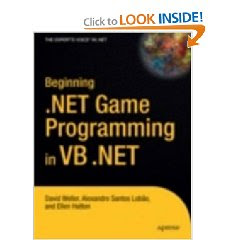
This highly-anticipated title provides a clear introduction to game programming for you, VB.NET programmers! Microsoft insiders have written an easy-to-read guide, so you can start programming games quickly. This book even includes an introduction to Managed DirectX9, and other advanced .NET features, like animation and sounds
Code examples are actually complete games, and include .Nettrix , .Netterpillars, River Pla.NET, Magic KindergarteN., D-iNfEcT, Nettrix II (for the Pocket PC), and a version of the classic game, Spacewars
User Review:
My biggest complaint with VB.NET game programming books so far (and I've read a few) has been that they either: A) try to teach elementary VB.NET using game flavored examples (but nothing about actual game development) or B) try to take existing game programming material and shoe-horn it into a VB.NET book. Sadly this book falls squarely into the second category (so far).
It's quite obvious that ALL of the sample code was originally written in C#. No big deal, it's easy enough to convert. However, if you aren't a VB.NET guy, don't you dare write a freaking book with VB.NET in the title. There are more differences between VB.NET and C# than just syntax!! For the love of god, 85% of the code samples (encountered so far) do NOT work as printed in the book. Some have glaring C# syntax still in them, but only in places... often sharing a line with VB.NET syntax. The tech editor should be drawn and quartered, on TV.
To make matters worse, the main author seems somewhat condescending (arrogant?) for someone who's never actually published a game in his/her life, ever (and had to have TWO other people write the book with him... neither of whom have ever published a game either.) This is an actual quote, immediately after some collision detection code that DOES NOT work as printed... If you think this is too much math, this is probably the place where you should take this book back and take up something less mathematically demanding, like nuclear physics! Ok... seriously? That comment would be a lot more impressive if your code ACTUALLY WORKED!
So far I have nothing positive to say about this book, so let me see... ok well, the girl on the back cover is kinda cute (allegedly one of the authors, although I have no idea which sections are written by whom... is that good or bad? You tell me.) Oh yeah, and the price I paid was 40% off, although sadly I still feel ripped off!
FWIW, I did eventually get the collision detection code to work on paper, although NO explanation is made for why the algorithm handles things a certain way, and the reader is told to perform a simple Google search for more info (I kid you not!!). I'm guessing this is because they don't actually know why the code they "borrowed" (from the net?) did things that way either.
At this point, I'm almost considering this book as a possible alternative energy source. I can't believe anyone at one of my favorite publishers actually read this book prior to printing it and selling it for $50 a copy. By the time you rip out the index, table of contents, foreward, introduction, recommended reading and 'about the author' section... it's barely 350 pages. Yes... I know it's not about page count, but when quality is already out the window, what other metric is there?
I'm not going to tell you the name of this book or the publisher (yet), because even though I've managed to work up this much bile and stomach acid over it, I'm only on page 35. God help me, I hope it gets better quickly.
It's funny, every truly good tech book I read makes me less inclined to try writing my own. This book, however, has convinced me that I still have a pretty good chance at getting published.
Free Download:




No comments:
Post a Comment